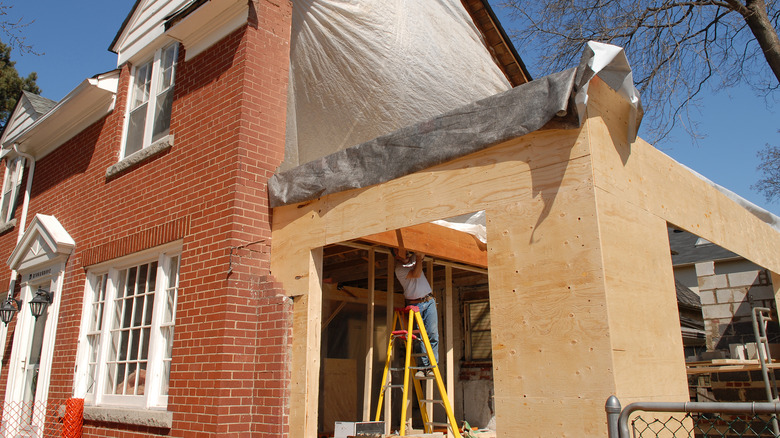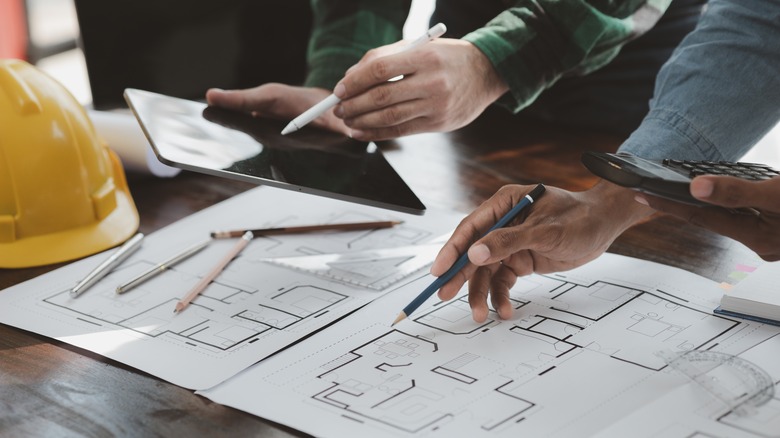Our Contracting Expert Tells Us The Questions You Should Ask Yourself When Considering A Home Addition
Many people want a home they can grow into. But what about when it seems like you've completely grown into the space you have? At this point, you may be considering a home addition. Whether you're looking for a larger primary suite, another bathroom for the family, or a larger kitchen to cook in, a home addition could solve your issues. However, it's a decision that you should consider thoroughly, and there are a few questions to ask yourself before diving into construction. "Have you considered the possibility of remodeling the use of the existing space first?" Matt DiBara, contractor and co-founder of The Contractor Consultants, asked House Digest in an exclusive interview. "For example, conversions of basements to finished spaces, or garages."
According to HomeAdvisor, an addition to your home can run between about $3,000 to $180,000, depending on size, materials, and finishes. Compare that to finishing a basement, which Forbes says costs between $4,700 and $41,000 on average. Since remodeling your current space is often less expensive and takes less time, this can be a good option if your home simply needs a refresh rather than an entirely new space. Understanding what you need to make your home more functional is important before going into renovations. If it's a matter of making a space more functional, a remodel may be a better choice — remodeling a basement or garage can feel like getting an addition to your home.
Is this the right home?
Ask yourself if your home is right for you. "Is there a reason to move or relocate?" Matt DiBara asked while speaking exclusively with House Digest. You may be forcing your current home to work for you, which could lead to an endless amount of projects. In this case, consider buying a home that better fits your needs. "[Look] at the long-term household goals and [ensure] there aren't other items on the wish list as well, such as a larger backyard, more space to park cars, a different neighborhood," DiBara continued. Your dissatisfaction with your current space might not be solved by adding to it, and the better option may be finding something that better fits your needs.
It's also a good idea to ask if this home can even be transformed in the way you want. "Can the vision become a reality?" DiBara asked. "Often times meeting with an architect or general contractor first to better understand the timeline, costs, and what is allowable by zoning and building codes may make the decision to add on a 'no-brainer', or a 'no way.'" Local laws may prohibit the type of addition you want, or you might find that the timeline is just too long to deal with. These kinds of issues could reveal that you're simply not living in the right house. Moving might be the right choice in this case.
Investment or for you?
Ask yourself if this addition is an investment in your home or one that will mostly be for your benefit. "Is this an investment, a pleasure, or both?" Matt DiBara asked in an exclusive interview with House Digest. If you're doing this to invest in your home and potentially increase a selling price or home value, it's important to carefully consider the additions, as there are some you should think twice about. Potential buyers are looking for home features that set the space apart and also feel well-thought-out and functional. Spaces like laundry rooms, garage storage, bathrooms, and kitchens tend to be highly sought after. Investing in entertaining areas like the living room or patio is also a good way to increase home value.
These additions, however, can also be for your pleasure. You may want a large indoor-outdoor entertaining area to host your guests. That kind of addition can make living in your home more enjoyable but also pay off if you ever sell your home in the future. However, some very specific additions would be more for the current homeowner than they would for any potential future ones — and that's okay. But it's important to note how that could affect your investment. "Understanding how much of the decision is based simply on what your goals are vs what will be best for a new buyer down the line or for your homes equity is crucial," DiBara said.


